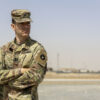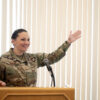Minnesota ministry teams lock arms for joint training
April 13, 2016 (CAMP RIPLEY, Minnesota) — Army and Air Force chaplains and chaplain assistants from the Minnesota National Guard took part in annual Religious Support Team collective training at Camp Ripley, April 8-9, 2016.
The training was organized to provide a common operating picture of techniques and practices used by chaplains in the field as well as in garrison and on assignment.
“This is a great opportunity for us, bringing all the ministry elements of the Minnesota National Guard together,” said Lt. Col. Michael Crawford, Camp Ripley Garrison chaplain.
The Unit Ministry Team is a combination of an officer as a non-combatant chaplain and a chaplain assistant who is an enlisted Soldier, trained in Soldier tasks and responsible for the security of the team. Additionally, the chaplain assistant rounds out the ministry of the UMT by being fully-trained in religious support matters to accompany the chaplain and is considered a ministry multiplier.
“Our Red Bull Unit Ministry Teams benefited greatly from the outstanding training preparation and the combat experience of the chaplains who provided the training,” said Maj. Buddy Winn, 34th Infantry Division chaplain.
Most Army and Air Force chaplains of the Minnesota National Guard also have a civilian ministry and are busy with their own faith community during the month. The care of and proper attention to the needs of Minnesota’s citizen-soldier and-airmen are often considered an extension of the daily responsibilities of military chaplains. However the availability of training time is often hard to arrange collectively.
The Minnesota National Guard has deployed chaplains overseas more than 25 times since 2003. Chaplains are expected to maintain a personal readiness status in preparation for deployment in order to serve as a member of the commander’s personal staff. The chaplain serves as the unit’s pillar of spiritual resilience in unpredictable and highly-stressful environments for extended periods.
The two-day training consisted of evaluation of religious support tasks such as researching and advising the command on the mission impact of indigenous religions, providing religious support to wounded or dying individuals, and dignified transfer of remains. Additionally, planning and execution of religious services across a range of military operations, supervising distinctive faith group leaders and providing religious support for a mass casualty scenario.
“This event gave the teams an opportunity to demonstrate proficiency and training readiness in these critical religious support tasks as they prepare to perform or provide religious support for Unified Land Operations in the future,” added Winn.
Army and Air National Guard chaplains are equipped to provide for the spiritual needs of all Service members through professional exposure to a variety of subject matter experts and staff functions. Collective UMT training ensures the maintenance of these critical skill sets.
by Staff Sgt. Anthony Housey
Camp Ripley Public Affairs



